 MyDogBreeds
MyDogBreeds Ratonero Bodeguero Andaluz is originated from Spain but Estonian Hound is originated from Estonia. Ratonero Bodeguero Andaluz may grow 9 cm / 3 inches shorter than Estonian Hound. Ratonero Bodeguero Andaluz may weigh 11 kg / 24 pounds lesser than Estonian Hound. Ratonero Bodeguero Andaluz may live 3 years more than Estonian Hound. Both Ratonero Bodeguero Andaluz and Estonian Hound has almost same litter size. Ratonero Bodeguero Andaluz requires Low maintenance. But Estonian Hound requires Moderate maintenance
Ratonero Bodeguero Andaluz is originated from Spain but Estonian Hound is originated from Estonia. Ratonero Bodeguero Andaluz may grow 9 cm / 3 inches shorter than Estonian Hound. Ratonero Bodeguero Andaluz may weigh 11 kg / 24 pounds lesser than Estonian Hound. Ratonero Bodeguero Andaluz may live 3 years more than Estonian Hound. Both Ratonero Bodeguero Andaluz and Estonian Hound has almost same litter size. Ratonero Bodeguero Andaluz requires Low maintenance. But Estonian Hound requires Moderate maintenance
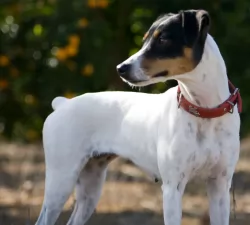 Long ago the English visited Spain to sample their wines, bringing with them smooth coated English Fox Terriers which were later crossed with other dog breeds of the area.
Long ago the English visited Spain to sample their wines, bringing with them smooth coated English Fox Terriers which were later crossed with other dog breeds of the area.
It is believed that the Andalusia Ratter’s ancestors were smooth coated fox terriers. The Club Nacional del Perro Andaluz Ratonero Bodeguero was established and in 1993 a standard for the breed was set.
It is only fairly recently that the breed was recognized by the Royal Canine Society of Spain but it isn’t recognized by any of the major kennel clubs.
 In 1947, the Estonian Hound was developed and remains today the only pure breed ever developed in Estonia. At that time the national economic minister of the Soviet Union declared that every country in the USSR must have a national dog breed. Thus, the Estonian Hound and the Estonian Kennel Union were born. The Kennel Union is currently seeking breed recognition from the Federation Cynoloqique Internationale.
In 1947, the Estonian Hound was developed and remains today the only pure breed ever developed in Estonia. At that time the national economic minister of the Soviet Union declared that every country in the USSR must have a national dog breed. Thus, the Estonian Hound and the Estonian Kennel Union were born. The Kennel Union is currently seeking breed recognition from the Federation Cynoloqique Internationale.
The Estonian Hound came from breeding local Estonian hunting dogs with several different breeds of foreign dogs. The Soviet decree also established that hunting dogs had to be no more than 17 inches high. This result in a hunting dog with great agility and drive that is extremely popular in now inependent Estonia. It is the national dog.
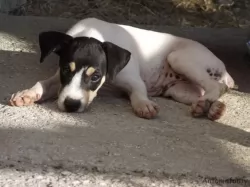 Also known as the Spanish Jack Russell, the Ratonero Bodeguero Andaluz looks very similar to this popular Jack Russell Terrier.
Also known as the Spanish Jack Russell, the Ratonero Bodeguero Andaluz looks very similar to this popular Jack Russell Terrier.
He is a small to medium sized dog with a lean, muscular body. The Ratonero developed in the south of Spain and is thought to be a mix of local ratting dogs and Fox Terriers. This ensured a quick, agile hunter.
The dog stands at between 35 – 43cm in height and weighs 6 - 9kg. The dog’s head is fairly small with dark brown eyes and half erect-half floppy ears. The coat is mainly white with some freckling. It is short and smooth with shades of black and tan covering the facial area. Some of these dogs are born with a natural bob-tail.
These dogs are known to have robust, hearty, happy personalities, full of the joys of living. They get on well with children as well as other pets if they have grown up with them.
Introductions should be slow if one of these dogs are brought into a home where there are already other pets. He is a very active breed and will be requiring plenty of mental stimulation and physical exercise.
They can provide quite a bit of entertainment for their human families as they can become quite clownish. They’re the kind of dogs that can adapt to life in the countryside or the city.
 The Estonian Hound is a strong, muscular body of medium size, with well-developed muscles and strong bones. It has a straight muzzle and skull with defined eyebrows and long drop ears. They have black noses and dark eyes. Their back is wide and straight, and their chest is deep and wide. They have skin that is tight with no wrinkles or folds anywhere.
The Estonian Hound is a strong, muscular body of medium size, with well-developed muscles and strong bones. It has a straight muzzle and skull with defined eyebrows and long drop ears. They have black noses and dark eyes. Their back is wide and straight, and their chest is deep and wide. They have skin that is tight with no wrinkles or folds anywhere.
The Estonian Hound is double coated, but the undercoat is not well developed. The top coat is rough, short and shiny. The tail has a thick covering of hair. The color is usually white with red patches, black or brown patches or yellow patches.
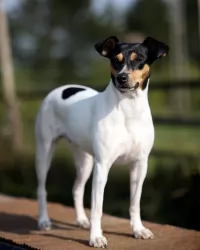 Your Ratonero Bodeguero Andaluz to this day is a ratter, always alert and ready to spring on prey. He is always lively and friendly, and with his loving nature, makes a splendid companion for his human family.
Your Ratonero Bodeguero Andaluz to this day is a ratter, always alert and ready to spring on prey. He is always lively and friendly, and with his loving nature, makes a splendid companion for his human family.
He is also a stubborn dog, liking to go his own way, and therefore will require training and socialization. He is an adaptable little dog too and when you bring him into your home he is willing to adapt to your way of life and become a loyal and loving member of your family.
 The Estonian Hound is a happy dog and loves to play with children. He was bred to hunt though and he can get fixated on a scent and knock over a small child.
The Estonian Hound is a happy dog and loves to play with children. He was bred to hunt though and he can get fixated on a scent and knock over a small child.
He is a hunting dog with great agility and drive.
He has had to be adaptable through his short history and is now more a companion than a hunting dog. He can live in the city or country.
He is intelligent and trainable. He is lively and energetic and the challenge might be keeping his attention long enough to train.
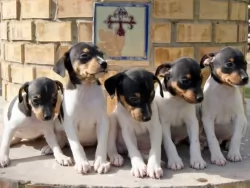 With good care, your Andalusian Ratter isn’t likely to get sick, but still, you would be better off knowing about some of the common dog diseases your pet could get.
With good care, your Andalusian Ratter isn’t likely to get sick, but still, you would be better off knowing about some of the common dog diseases your pet could get.
This is usually seen in young dogs where there is lameness in the hind legs and hip pain. It is believed that Legge Perthe’s occurs because of a genetic predisposition, and when it develops, there is sadly no cure.
Skin infections may seem fairly mild but nothing can be further from the truth. They can be painful and frustrating. Skin redness, dryness, itchiness and pain can cause your pet to lick and bite and make the situation worse. If your pet is being driven crazy by a skin irritation, get him to the vet who will do a complete physical examination.
Other diseases to be aware of include hip dysplasia, obesity, epilepsy and bloat.
 With such a young breed there have not been any studies done on their health or genetic issues. It seems the breed is fairly healthy but there is too little information to really say. Being confined to Estonia there has been little commercial or backyard breeding. He is less likely than most pure breeds to have genetic issues.
With such a young breed there have not been any studies done on their health or genetic issues. It seems the breed is fairly healthy but there is too little information to really say. Being confined to Estonia there has been little commercial or backyard breeding. He is less likely than most pure breeds to have genetic issues.
It is likely that dogs of his type are at risk for:
Caused by excessive exercise before or after having eaten a large meal. It is suggested that you feed your English Setter twice a day, smaller meals and not right before or after strenuous exercise.
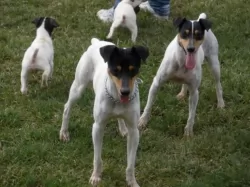 This is a fairly low maintenance dog as the short smooth coat will be easy to brush twice a week.
This is a fairly low maintenance dog as the short smooth coat will be easy to brush twice a week.
Check him over for unusual lumps, trim his nails and check inside his ears, look into his eyes to ensure they are bright and alert and look inside his mouth to make sure he doesn’t have any rotten teeth.
Have your pet neutered or spayed if you want to avoid puppies. This can be beneficial for your pet’s health too.
Feed your Ratonero Bodeguero Andaluz only the best food there is. If you opt for commercially manufactured food, make sure its full of vitamins and minerals. Your little pet will want consistency and simplicity with his food to avoid digestive problems.
Try and provide him with some home-made food which can be added to the dry kibble twice a week as a treat. Boiled chicken, brown rice or pasta and spinach, sweet potatoes and carrots all chopped up ad mixed into the dry kibble will ensure your pet’s health.
Some raw meat added in occasionally will also go towards ensuring his good health.
Always make sure he has access to fresh, cool water.
Provide him with a safe, dry, warm, comfortable place to sleep.
Get him to the vet when you see he is sick.
Ensure he has sun and shade in the garden.
Never ever leave him in a hot car.
 Feed a high quality dry food made for puppies. Feed ¼ to ½ cup per day in 2-3 meals for the first six months.
Feed a high quality dry food made for puppies. Feed ¼ to ½ cup per day in 2-3 meals for the first six months.
Feed 1 to 2 cups in two meals from 6 months to a year or so.
Feed about 2 to 3 cups in two meals.
As previously mentioned this seems to be a fairly healthy breed.
Be careful not to feed a large meal before or after exercise due to possibility of bloat.
Check their ears and clean them periodically.
The Estonian Hound is a hunting dog and needs a good deal of exercise – at least an hour and a half every day or a long walk if not used for hunting. He is a working dog with a lot of energy and stamina. Don’t let him off leash though or he will follow his nose and take off. He is usually calm and quiet indoors if he gets enough physical and mental stimulation outdoors. He can be destructive and loud, nervous and hyper if he doesn’t. They enjoy Frisbee, agility, tracking and of course hunting.